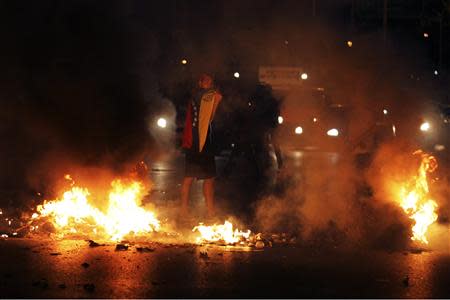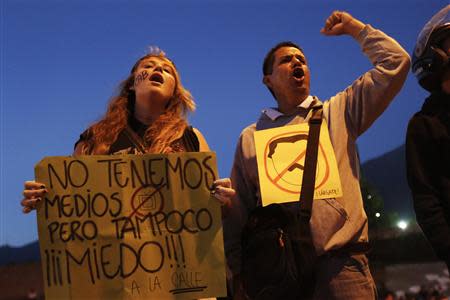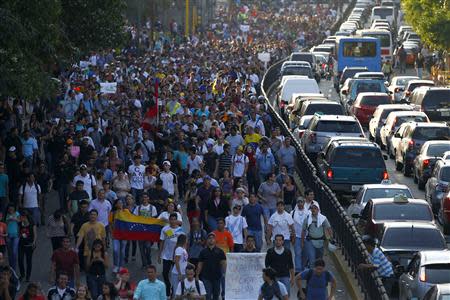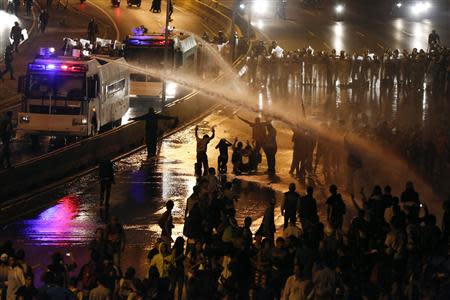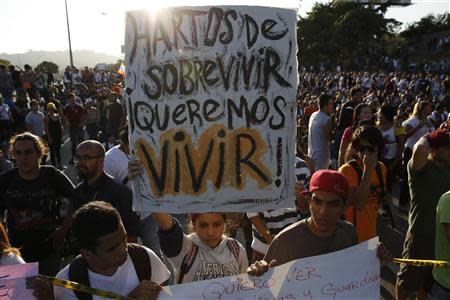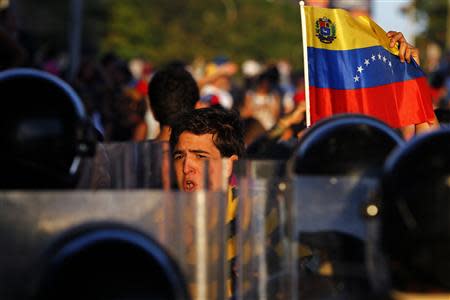Anti-Maduro protests persist in Venezuela, dozens jailed
By Andrew Cawthorne and Diego Ore CARACAS (Reuters) - President Nicolas Maduro's government kept dozens of student protesters behind bars on Friday as unrest still rumbled across Venezuela following this week's violence at political rallies that killed three. Demonstrators gathered again in various cities, blocking roads and burning tires in some cases, to denounce the repression of protests and make a litany of complaints against Maduro ranging from rampant crime to shortages of basic products. "We're going to stay out in the streets for the same reasons as yesterday and the day before: inflation, insecurity and a repressive state that refuses to release our colleagues," student Marcos Matta, 22, told Reuters, in Caracas. Defying the president's prohibition of demonstrations, about 500 people gathered in Caracas' Altamira Square, a heartland of past opposition protests, to chant slogans and wave banners. Maduro, a 51-year-old former union activist and bus driver, accuses his foes of seeking a coup against him similar to one that briefly toppled his predecessor Hugo Chavez in 2002. However, there is no sign the street demonstrations threaten to oust him, nor that the military, whose role was crucial to Chavez's 36-hour unseating, will turn against Maduro. The protests might in fact give him a chance to unite competing factions within the ruling Socialist Party, divide the opposition where many moderates oppose the street tactics, and distract Venezuelans' attention from economic problems. Maduro has called supporters onto the streets of Caracas for Saturday and insisted unauthorized rallies will be stopped. "This is not Ukraine," he said, in reference to months of anti-government protests there in which six people have died. Opposition activists say about 150 protesters have been arrested in the last two weeks, most after Wednesday's violence, with most due to face charges of violence and about 90 still behind bars on Friday. The government puts the number of arrests at about 70. LOPEZ TAUNTS MADURO Hardline opposition leader Leopoldo Lopez, whom the government is calling the "face of fascism" and the intellectual author of the violence, remained in his Caracas home on Friday despite a judge's arrest warrant for him, party colleagues said. He says peaceful protests have been infiltrated by provocateurs and attacked by militantly pro-government gangs known locally as "colectivos". The 42-year-old U.S.-educated economist and leader of the Popular Will party taunted Maduro via Twitter: "@NicolasMaduro: don't you have the guts to arrest me? Or are you waiting for orders from Havana? I tell you, the truth is on our side." Maduro's foes view him as a stooge of Cuba's communist government who lacks Chavez's charisma and is leading the economy to ruin by sticking with failed socialist policies. It was not immediately evident why police had not acted on the arrest warrant to visit Lopez's home, though such action could fuel further protests given the tense climate. Congress head Diosdado Cabello Tweeted that the "fugitive" Lopez had tickets for a Saturday flight to Bogota, but gave no evidence of that. "You're not going to escape, coward," he said. Lopez has for two weeks been urging Venezuelans onto the streets in a campaign dubbed "The Exit". He insists he only wants to promote legal change, such as Maduro's resignation or departure via a recall referendum, using peaceful protests. But their tactics have split Venezuela's opposition coalition, and a radical rump of masked demonstrators have been starting fires, throwing stones and damaging buildings. Armed, pro-government "colectivo" groups have also joined the fray, with groups on motorbikes buzzing round Caracas. A colectivo leader was among the three shot dead on Wednesday. Sixty-six people have been injured in violence around the nation this week, authorities say. FOREIGN CONCERN Venezuela's leftist allies around Latin America sent messages of solidarity to Maduro over what they termed "coup" intentions. The European Union called for calm and dialogue. David Smilde, a sociology professor at the University of Georgia who has studied Venezuela for 20 years, said both sides deserved censure for their handling of this week's events. "Leopoldo Lopez's calls for peaceful mobilization are disingenuous when his acts seem to be intentionally creating the conditions for unintended violence. He is effectively putting student protesters in the line of fire to further what he sees as the interests of the country," Smilde blogged. On the other side, the government should be reining in violent groups, he added. "Public security is the government's responsibility and they are coming up tragically short." Despite stable oil prices that keep dollars pouring into the OPEC member's economy, Venezuela's heavily traded debt has fallen steadily since mid-December on political tension and investor concern over lack of economic reforms. Venezuelan bond prices have dropped 1.5 percent since Wednesday, when the violence flared up, and are near their lowest level since mid-2012, according to JPMorgan data. The country's bond yields, which signal investor perception of default risk, are well above 15 percent. That is the highest of major emerging market nations, above Ukraine and Argentina. With both sides in Venezuela virulently blaming each other for the violence, international rights groups have called for an investigation. They have also expressed concern over the roughing up of some journalists and the pulling of a Colombian news station, NTN24, off air as it showed Wednesday's events. (Additional reporting by Daniel Bases in New York; Girish Gupta and Brian Ellsworth in Caracas; Editing by Brian Ellsworth, W Simon and Meredith Mazzilli)
